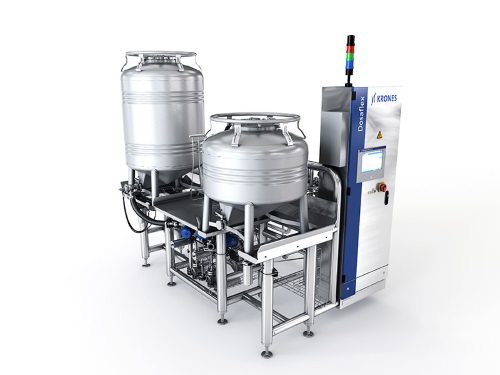Krones has developed the DosaFlex aseptic container station for the dosing of aseptic components in finished beverages with a solids content.
This has been made possible by the provision of product components with an increased concentration of solids in aseptic containers – an option that used to be offered only for aromas and concentrates.
The aseptic containers may be pressurized with an overlay of sterile air or nitrogen.
This prevents recontamination or absorption of unwanted substances such as oxygen.
For continuous operation, two container connections can be used alternately.
To ensure fast container change-overs, the connections are sterilized with steam before the product path is opened.
In the single-flow process, hitherto compounds with a solids content have been non-aseptically blended before the beverage processing section and then heated up together with the fruit-juice content in an ultra-high temperature system.
The disadvantage here is that the liquid content also has to be heated up for significantly longer than necessary, with a resultant impairment of the quality.
The new aseptic container station is suitable for beverage producers who want to try out new beverages with a solids content on test markets.
The container station is integrated between the units for continuous product treatment and the filler.
The finished beverage is blended using controlled dosing in a double-seat valve with an adjacent vapor seal, designed to cope with aseptic processes.
For low-acid products, a vapor seal is additionally provided in the condensate drain, so as to ensure a sterile production process even with sensitive products.
The rate of damage to particles that are larger than 3 x 3 x 3 mm is below 5%, while the dosing accuracy lies at +/-0.3% of the dosing quantity involved: both of
These figures are significantly lower than those encountered in classical single-flow processes.
The aseptic container station bears the company’s enviro seal for energy- and media-efficiency.










